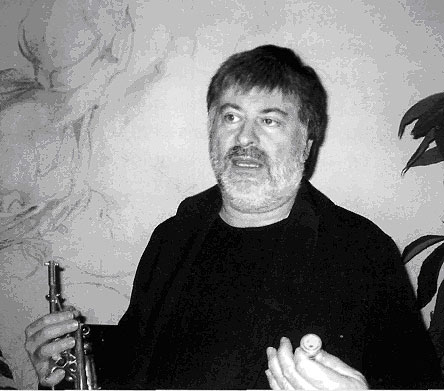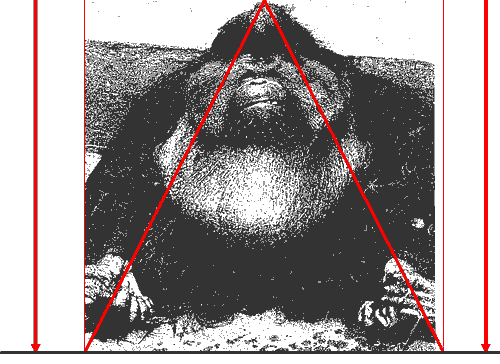| Introduction | Breathing | Posture | Emission of sound | Lips | Pedagogy |

As we have discovered in previous pages, our body has a very crucial role in the musical gesture.
- We are, as human beings, the creators of sound.
-
The instrument is but the propagator, the amplifier.
Hence, it is important to reflect on our corporal entity, to study its functional and mechanical aspects, without forgetting an important part: the brain. The latter is not simply a functional organ but also the seat of thought, of culture, it is the control centre of consciousness and also of the subconscious.
- Consciousness is the active home of reflection, enabling a deliberate gesture, that which is thought of, prepared and carried out.
- The subconscious is considered to be a sort of conditioned and pre-set memory enabling us to function spontaneously, with automatic attitudes and no immediately previous thought.
Of course, our person is educated culturally and socially by the family, the state, religion...in order to fit into the scheme of society and to successfully evolve in a pre-selected and controlled structure. It will obey certain necessary codes of life, as a human and citizen, which is preferable and reassuring for all fellow citizens, but restrictive and inhibiting in artistic and creative expression.
To illustrate this I shall compare the musician to the stage actor. As soon as he walks on stage he must completely drop his social top coat and hang it up in the dressing room. He
must forget his "consistence" and rediscover his animal origins cleansed of all cultural and sociological pre-requisites, in order to be true. For a moment he must throw off all social conventions to recreate himself and take on the appearance of a new character. He must transcend himself and use all his body to work for his sensitivity. During these instants the whole body gives itself up, without hesitation, with all its energy focused on the musical or artistic gesture. On stage, that is called risk-taking, but that is not necessary if you hope to see the Holy Grail.
To do this, the musician of the so called "wind" instrument, must pay attention to his posture.
The object called "instrument", however respectable, beautiful, historical etc. it may be, should be seen only as an extension of the artist.
When you play standing up, you must stand firmly but not stiffly, your feet slightly apart, aiming for stability and verticality, keeping the knees supple. The feet are well on the ground as if trying to spread the soles. The idea of pressing down into the ground, to take root, is important. The head should be in a position similar to the idea of a double chin, (like opera singers).
Mr Robert Pichaureau used three popular sayings to support the demonstration. "A sensible man has his head well on his shoulders. A person who has a good back seems strong. Someone who has their feet on the ground cannot be unbalanced." Having recited these three formulas the master would pull out from his documents, the enlarged picture of a gorilla whose outline formed a triangle placed on its base. " You must be a pile" he would say.
When we observe this picture, we get a feeling of a stable mass that cannot be knocked down.

It seems to take root in the ground. We can easily understand this posture, as we often adopt it in our daily life--for example when we encourage cyclists or other sportsmen and women--when we are angry and cry out--or when a child shows its eagerness for a present. During these act, which are unprepared, we show our exuberance to all and sunder, without holding back. At this precise moment it could be said that we are earnest. We affirm ourselves wholly. Anybody can be earnest, it depends solely on the spontaneity and naturalness of the person. I would remind you that no conscious breathing preparation is necessary for these natural gestures and also that generally they are powerful, lasting and "true". For the musician that can be translated by the word desire to play, therefore pleasure. In this situation only, will it be felt in the same way for the listener.
One of the first difficulties experienced by the beginner in music will be just that; to try and find the natural and fundamental earnestness. He, or she, must especially not try to do it deliberately. On the contrary, they must "let themselves go". We could quote another popular saying, "he's got guts", the virtual image of the cry coming forth from the belly, takes on a new meaning.
The opposite and negative posture would be to stand on the tips of your toes, stretch your neck, move your head towards the instrument as if to meet it. This would push
us to come out of our bodies and "lose" ourselves in the sound space where we are playing. The instrument object would become the sole perpetrator of the sound. Playing would soon become awkward.
Our consciousness would make us use a breathing movement which would be harmful to the procedure, the sound quality and relaxation. The desire to play would rapidly be transformed into an obligation to obtain results. The communication of sensitive expression would turn into a technical exploit, (perhaps?).
To illustrate the work on the body, Mr Robert Pichaureau used a metaphor: "The artist is like a tree, which sends its roots down into the ground. If the leaves decay, you can always, in an emergency, try to heal them directly on the surface, that may have some effect, but will be restrictive and sporadic. It is much better to look after the roots. The effects may not be immediate and spectacular, it will require more time, but it will be longer lasting and have an effect on the whole of the plant. The leaves are a reflection of the tree's good health."
In the next pages, we will discuss the throat, the positioning of the tongue, of the squeeze and the lips, for instruments with a mouthpiece, the importance of which is reduced, if the player respects the proposed method. We shall also see the connection with at the mouthpiece, first contact with the instrument "pipe".
© Alain Faucher 2006